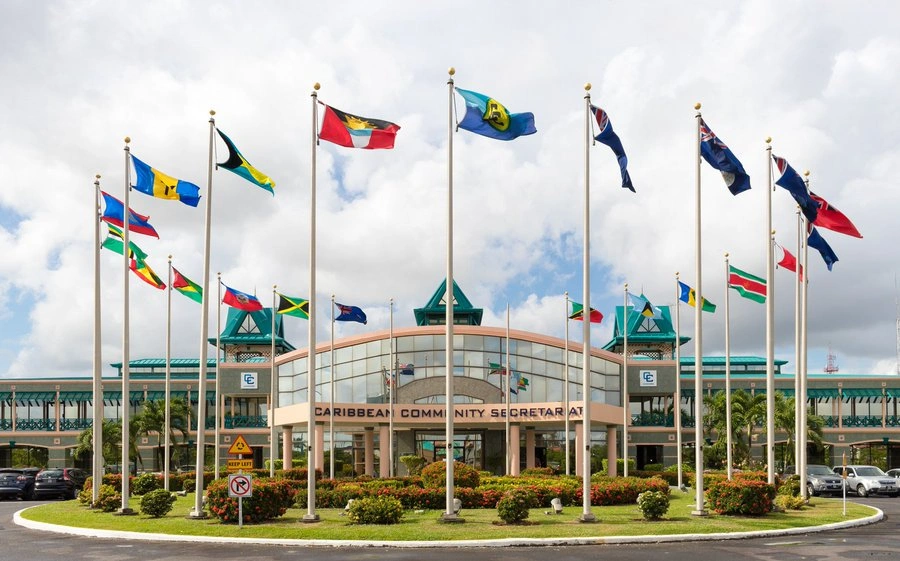Carib Sentinel | Pretoria, South Africa — February 17, 2025
PRETORIA, South Africa — Hundreds of white Souths Africans gathered outside the U.S. Embassy here on Saturday, waving placards emblazoned with “Thank God for President Trump” and decrying what they called systemic racism by their government. The demonstration, organized largely by the Afrikaner community, amplified a transatlantic clash over land reform policies and racial equity in a nation still grappling with the legacy of apartheid.
The protestors, many clad in traditional Afrikaner attire or sporting “Make Afrikaners Great Again” caps, criticized South Africa’s new Expropriation Act. The law, which allows land redistribution for public benefit, has become a flashpoint in a broader debate over historical injustices. While the government insists the legislation aims to redress centuries of colonial and apartheid-era land dispossession, critics—including former U.S. President Donald Trump—claim it unfairly targets white landowners.
Trump’s Executive Order Fuels Tensions
A week prior to the rally, Trump signed an executive order cutting U.S. aid to South Africa, accusing its Black-led government of “rights violations” against Afrikaners, descendants of Dutch settlers who comprise part of the country’s 7% white minority. The order also proposed offering refugee status to Afrikaners, a move swiftly rejected by prominent groups like the trade union Solidarity and lobby organization AfriForum, who declared, “We are not going anywhere” .
South African President Cyril Ramaphosa rebuked Trump’s claims as “misinformation,” emphasizing that the law prohibits arbitrary land seizures and prioritizes public interest. “The people of this country know the pain of forced removals,” Ramaphosa told Parliament, referencing the displacement of millions of Black South Africans during apartheid .
Land, Legacy, and Lingering Divisions
The dispute underscores South Africa’s fraught journey to reconcile its past. Whites, though a minority, own approximately 70% of private farmland—a disparity rooted in colonial and apartheid policies. The government argues the Expropriation Act seeks to balance this inequity, but many Afrikaners fear it will erase their cultural and economic heritage. “They want to bring a top Laborite onto the Integrity Commission, which is investigating so many Laborites. That cannot happen,” one protester analogized, echoing broader frustrations.
The rally also highlighted grievances over affirmative action policies, such as Black Economic Empowerment (BEE), which protesters called discriminatory. These laws, enacted post-apartheid to uplift Black citizens, have long stirred resentment among some whites.
Musk, Misinformation, and Global Repercussions
Trump’s stance found vocal support from Elon Musk, the South Africa-born billionaire and Trump adviser, who has repeatedly accused the government of anti-white bias. Musk’s criticisms intensified after his Starlink satellite service failed to secure a license in South Africa due to noncompliance with BEE requirements.
Meanwhile, the U.S. aid freeze threatens South Africa’s HIV/AIDS programs, which rely on $440 million annually from Washington. Health experts warn the cutoff could destabilize the world’s largest antiretroviral treatment initiative, affecting 5.5 million patients.
A Nation at a Crossroads
As Pretoria navigates these tensions, the rally revealed a stark dichotomy: for some, Trump’s intervention is a lifeline; for others, a reckless distortion of South Africa’s complex reality. “He should come see for himself,” said Sithabile Ngidi, a Johannesburg trader, reflecting widespread skepticism of Trump’s narrative.
The demonstration, though peaceful, laid bare the enduring scars of apartheid and the challenges of forging unity in one of the world’s most unequal societies.
Carib Sentinel: Delivering authoritative coverage of Caribbean and global affairs. Follow us for incisive reporting on politics, culture, and social justice.



